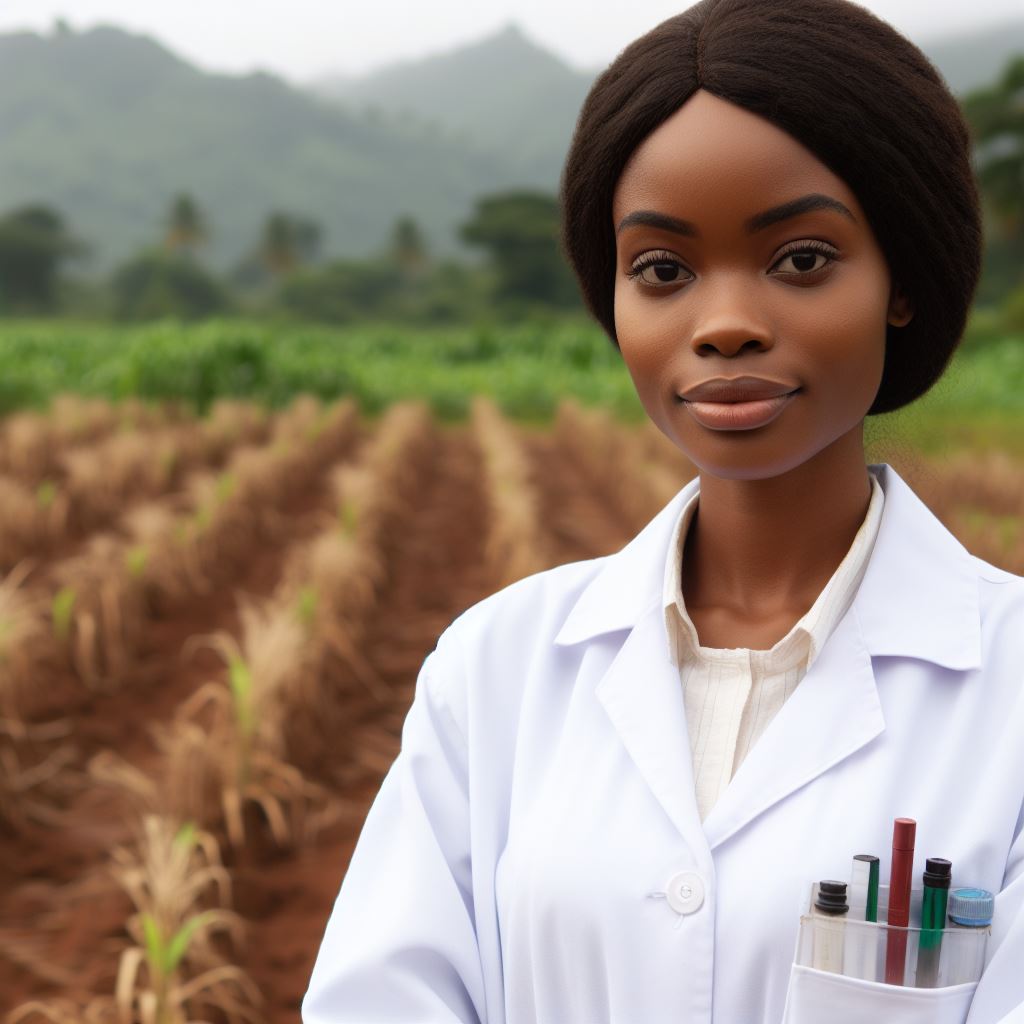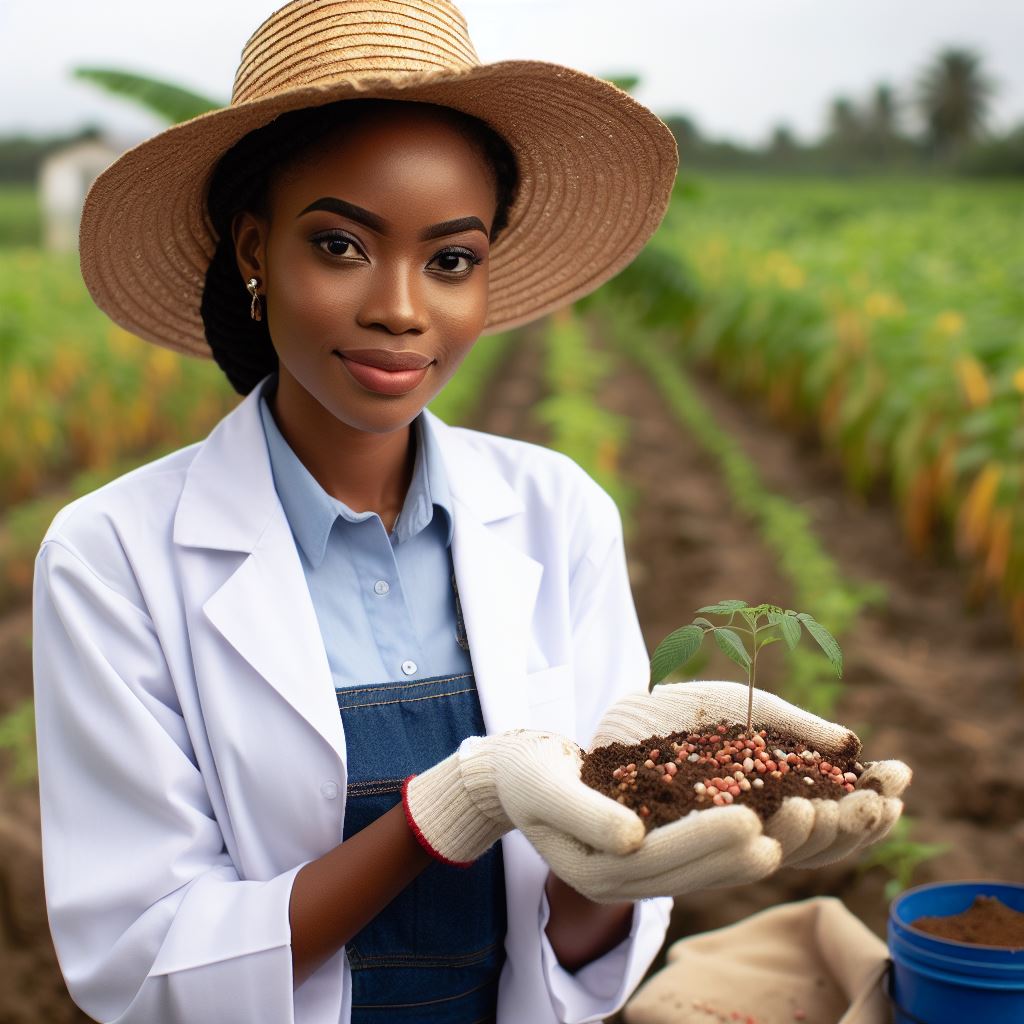Introduction
In this blog post, we will explore Women in Crop and Soil Science.
Crop and soil science play a crucial role in agriculture and food production.
The importance of these fields cannot be understated as they contribute to sustainable farming practices.
However, it is disheartening to note the underrepresentation of women in crop and soil science in Nigeria.
The unequal gender ratio in this field raises concerns about diversity and inclusivity.
Women’s participation is vital to ensure a holistic approach to agricultural development.
Empowering female Professionals in agricultural and soil sciences. can lead to innovative solutions and increased productivity.
Despite the challenges, many Nigerian women are breaking barriers and excelling in this field.
Their success stories serve as inspiration for future generations, encouraging more women to pursue careers in crop and soil science.
Efforts must be made to provide equal opportunities and support for women in this male-dominated field.
Promoting gender parity in crop and soil science will contribute to a more sustainable and prosperous agricultural sector in Nigeria.
It is time to recognize and celebrate the contributions of women in crop and soil science in Nigeria.
Together, we can create a more inclusive and diverse field that benefits both individuals and the nation as a whole.
Historical Overview
Brief history of crop and soil science in Nigeria
Crop and soil science in Nigeria have a rich history that dates back several centuries.
During pre-colonial times, indigenous agricultural practices focused on subsistence farming and the cultivation of staple crops.
With the arrival of colonial rule, there was a shift towards cash crops such as cocoa, oil palm, and rubber.
This led to the establishment of research institutes and agricultural schools to support the growing agricultural sector.
Significant developments and milestones in the field
One significant development was the establishment of the West African Cocoa Research Institute (WACRI) in 1944.
WACRI played a vital role in developing new cocoa varieties and improving farming techniques.
Another milestone was the establishment of the International Institute of Tropical Agriculture (IITA) in 1967.
IITA focused on research and development in crop improvement, soil fertility, and crop protection.
Role of women in contributing to crop and soil science over time
Women have always played a crucial role in Nigerian agriculture, including crop and soil science.
In traditional farming communities, women were responsible for planting, weeding, and harvesting crops.
However, their contributions were often overlooked and undervalued in formal agricultural institutions.
Over time, women have become increasingly involved in crop and soil science research and education.
They have made significant contributions to the development of improved crop varieties and sustainable farming practices.
Women scientists have also been actively involved in addressing gender disparities in agricultural research and extension.
Their research focuses on empowering women farmers, improving food security, and promoting sustainable land management.
Establishment of gender-responsive programs and policies
Women’s involvement in crop and soil science has grown further with the establishment of gender-responsive programs and policies.
These initiatives aim to provide equal opportunities for women in agricultural education and research.
The role of female Professionals in agricultural and soil sciences. is crucial for achieving sustainable agriculture and food security in Nigeria.
Their unique perspectives and knowledge contribute to innovative solutions for the challenges faced in the field.
Investing in women’s education and research capacity in crop and soil science can lead to significant socio-economic development.
Women scientists in Nigeria continue to inspire future generations of women to pursue careers in agriculture.
Their achievements serve as a testament to the potential and talent of women in the crop and soil science field.
As Nigeria strives to meet its agricultural goals, it is essential to recognize and support the valuable contributions of women.
By promoting gender equality and empowering women in crop and soil science, Nigeria can unlock its agricultural potential and ensure a sustainable future.
The involvement of women in crop and soil science is not only a matter of equality but also a matter of national development.
Women’s perspectives and expertise are needed to address the complex challenges facing Nigerian agriculture.
With continued support and recognition, women in crop and soil science will play a vital role in shaping the future of Nigerian agricultural innovation and sustainability.
Transform Your Career with Expert Guidance
Get personalized mentorship consulting that’s tailored to your unique path. Our expert advice is actionable and exclusive.
Get StartedRead: Agrochemicals Usage: Nigeria’s Soil Perspective
Challenges Faced by Women in Crop and Soil Science: Nigeria’s Scene
Various Challenges Faced by Women in Pursuing a Career in this Field
- Gender Bias: Women face biases and stereotypes that hinder their progress in crop and soil science.
- Lack of Representation: Limited visibility of successful women in the field discourages aspiring female scientists.
- Limited Networking Opportunities: Women face challenges in building professional networks due to existing gender disparities.
- Inadequate Financial Support: Women often struggle to secure funding for research projects and further education.
- Work-Life Balance: Balancing family responsibilities with career growth is a significant challenge for women.
- Gender Discrimination: Women sometimes face discrimination and unequal treatment in educational and professional settings.
- Lack of Role Models: The absence of female role models hampers women’s motivation and confidence in pursuing this field.
Societal and Cultural Barriers That Limit Women’s Participation
- Traditional Stereotypes: Societal expectations may deem agriculture and science more suitable for men, discouraging women’s involvement.
- Lack of Family Support: Cultural norms often prioritize household duties over professional aspirations for women.
- Limited Decision-Making Power: Women have less influence in traditionally male-dominated communities, impacting their ability to participate in crop and soil science.
- Inequality in Land Ownership: Women’s limited access to land rights prevents them from engaging fully in agricultural practices.
- Gender-Based Violence: The risk of harassment and violence sometimes discourages women from pursuing careers in predominantly male environments.
- Societal Pressure: Women often face pressure to conform to societal norms regarding marriage and family, hindering their career ambitions.
- Negative Perceptions: Society’s perception of women’s abilities in science and agriculture can undermine their confidence and motivation.
Educational and Infrastructural Issues That Affect Women’s Access to Opportunities
- Limited Access to Education: Girls in rural areas often lack access to quality education, preventing them from pursuing careers in crop and soil science.
- Inadequate Scholarships and Grants: Women face challenges in securing financial aid for higher education and research programs.
- Gender Bias in Classroom: Stereotyping and bias within education systems can discourage girls from studying science-related subjects.
- Unsafe and Inadequate Facilities: Lack of proper infrastructure, such as laboratories and study spaces, limits women’s participation.
- Inequality in Resources: Women often have limited access to essential resources, including books, technology, and research materials.
- Lack of Mentorship Programs: Women in crop and soil science may struggle to find mentors who can guide and support their career development.
- Inflexible Academic Systems: Rigidity in academic structures and schedules can make it difficult for women to balance their responsibilities.
In fact, women in crop and soil science in Nigeria face a myriad of challenges.
These range from gender bias and societal barriers to educational and infrastructural limitations.
Addressing these issues requires concerted efforts in promoting gender equality, providing equal opportunities, and creating supportive environments for women’s participation in the field.
Read: Comparing Nigerian Crop Tech Curriculum with Global Standards

Efforts to Empower Women in Crop and Soil Science
When it comes to crop and soil science, women in Nigeria have been making remarkable strides.
Efforts have been put in place to support and empower women in this field, with various initiatives and programs being implemented.
Initiatives and Programs
Women in Agricultural Development (WIAD) is a program aimed at empowering women in crop and soil science.
WIAD provides training, mentorship, and networking opportunities for women in the field.
The Women in Science and Technology Program (WIST) is another initiative that promotes gender equity and inclusivity.
WIST offers scholarships, grants, and research opportunities specifically to female Professionals in agricultural and soil sciences.
The African Women in Agricultural Research and Development (AWARD) is an organization that supports women in agriculture, including crop and soil science.
AWARD provides fellowships, leadership training, and mentorship programs to enhance women’s capabilities in the field.
Government Policies and Interventions
The Nigerian government has recognized the importance of promoting gender equity and inclusivity in crop and soil science.
To achieve this, several policies and interventions have been implemented.
The National Gender Policy promotes equal opportunities for men and women in various sectors, including agriculture.
It aims to eliminate gender disparities and empower women in areas such as crop and soil science.
The Agricultural Transformation Agenda (ATA) focuses on developing the agricultural sector, with special attention given to supporting women.
The ATA provides financial and technical assistance to women in crop and soil science, enabling them to excel in their careers.
The Women in Agriculture Development Program works to empower women in agriculture and promote their active participation in the sector.
This program supports women in crop and soil science through capacity building, access to credit, and market linkage initiatives.
Successful Stories and Role Models
There are numerous success stories of women who have excelled in crop and soil science, serving as role models for aspiring young women.
Dr. Mary Umaru is a renowned crop scientist who has made significant contributions to agricultural research.
Her work on soil fertility management has greatly improved crop yields and sustainable farming practices.
Dr. Fatimah Ahmed is another prominent figure in the field of crop and soil science.
She has conducted extensive research on sustainable soil management techniques, helping farmers adopt efficient and eco-friendly practices.
Professor Grace Adesanya-Davies is a trailblazer in crop breeding and genetics.
Her groundbreaking research on high-yielding and disease-resistant crop varieties has had a transformative impact on agriculture in Nigeria.
These successful women serve as inspirations and role models, inspiring young girls to pursue careers in crop and soil science.
Read: Hands-On: Field Work in Nigerian Soil Science
Success Stories
Inspiring stories of women who have made significant contributions to crop and soil science in Nigeria
Women have been making significant contributions to crop and soil science in Nigeria, and their accomplishments have paved the way for future generations.
Adeola Oyinlola
Adeola Oyinlola is a dedicated scientist who has dedicated her career to improving the agricultural practices in Nigeria.
Her research on soil fertility has led to breakthroughs in crop yield and food security in the country.
Oyinlola’s work on soil analysis and nutrient management has provided farmers with valuable insights on how to optimize their crop production.
Her research findings have led to the development of sustainable farming practices that have transformed the agricultural landscape in Nigeria.
Through her work, Oyinlola has not only improved the lives of farmers but also contributed to the overall economic development of Nigeria.
Her success story serves as an inspiration for other women to pursue careers in crop and soil science.
Chinyere Okonkwo
Chinyere Okonkwo is another trailblazer in the field of crop and soil science in Nigeria.
Her research focuses on the development of disease-resistant crops, particularly in areas prone to pest infestation.
Okonkwo’s breakthrough in developing resistant varieties of staple crops, such as maize and cassava, has significantly reduced the reliance on pesticides and increased crop yields.
Her work has proven instrumental in ensuring food security and sustainability in Nigeria.
Moreover, Okonkwo’s accomplishments have inspired young women to pursue careers in agriculture and contribute to the development of innovative solutions to crop challenges.
Her success story highlights the importance of investing in research and innovation in the field of crop and soil science.
Oluwakemi Oladiti
Oluwakemi Oladiti is a renowned expert in soil conservation and sustainable land management in Nigeria.
She has dedicated her career to developing strategies to combat soil erosion and degradation.
Oladiti’s research has led to the implementation of effective soil conservation practices in Nigeria, preventing soil erosion and preserving the fertility of agricultural land.
Her work has had a lasting impact on improving agricultural productivity and ensuring the sustainability of Nigeria’s food system.
Her success story not only showcases the importance of soil conservation but also encourages young women to explore the diverse areas of crop and soil science and make a difference in their communities.
Importance of Success Stories
These success stories are paramount in motivating and encouraging other women to pursue careers in crop and soil science.
- They serve as inspiring examples of what women can achieve in the field, breaking gender barriers and stereotypes.
- Success stories demonstrate that women have the capacity to lead and make significant contributions to agricultural research and development.
- They provide role models for young girls, highlighting the various opportunities available in crop and soil science.
- Success stories create a sense of empowerment and instill confidence in women, motivating them to pursue their passion in agriculture.
- Furthermore, these stories showcase the important role women play in addressing food security and environmental challenges in Nigeria.
By celebrating the achievements of women in crop and soil science, we inspire future generations to explore and contribute to the field, ultimately leading to a more sustainable and prosperous agricultural sector in Nigeria.
Read: Comparing Agricultural Policies: Nigeria & Beyond
Conclusion
This blog post has shed light on the current scene of women in crop and soil science in Nigeria.
We have discussed the challenges faced by women in this field, including societal norms and lack of opportunities.
Gender equality and inclusivity are crucial in crop and soil science.
By promoting equal opportunities for women, we can tap into the full potential of our society and maximize productivity in this field.
It is imperative to create an environment that encourages women to participate and excel in crop and soil science.
Increasing women’s representation in crop and soil science can lead to numerous benefits and opportunities.
Firstly, it will diversify perspectives and ideas, fostering innovation and creativity.
Secondly, it can address the pressing issue of food security by utilizing a wider talent pool.
Finally, it will empower women economically and socially, contributing to overall development.
It is high time that we break the barriers and support women in crop and soil science.
Collaborative efforts are needed from various stakeholders, including government bodies, educational institutions, and research organizations.
We must create awareness, provide scholarships, and mentorship programs to encourage women to pursue careers in this field.
To create a sustainable future, we must ensure that women have equal opportunities in crop and soil science.
Let us work towards gender equality and inclusivity and capitalize on the potential benefits that arise from increasing women’s representation.
Together, we can build a stronger, more prosperous agricultural sector and society as a whole.




